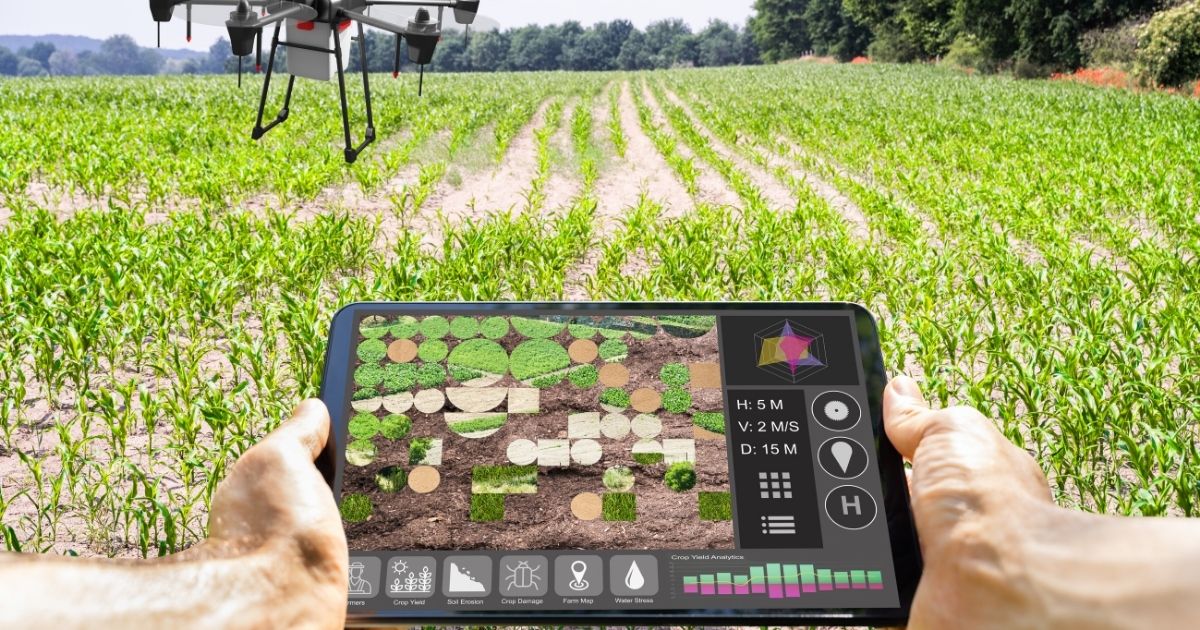- Who We Are
- What We Do
- Success Stories
- Careers
- News & Events
- Contact us

Agriculture has continuously improved with the advent of new technologies, ranging from motorized equipment to biotechnology. With the population set to reach 9 billion by 2050, the agriculture industry is attempting to increase efficiency by 70% with the help of futuristic technologies like Artificial Intelligence (AI) and Machine learning (ML).
Let’s have a look at some of the uses and benefits of this technology in agriculture.
1. Precision Agriculture With Predictive Analytics
Precision agriculture (PA) is a management method involving AI systems to increase harvest quality and accuracy. PA employs AI technology to assist in detecting plant diseases, pests, and inadequate plant nutrition on farms. AI sensors can identify and target weeds while determining which herbicides to spray within the appropriate buffer, reducing herbicide overapplication and herbicide resistance.
Farmers are employing artificial intelligence (AI) to enhance agricultural precision by developing probabilistic models for seasonal forecasting. These models may look months ahead and use collected data to offer farmers base forecasts for the best crop kinds for the season and appropriate planting timings and places. Agricultural AI systems can enhance farm management by making decisions based on weather patterns projected for the future season.
2. Identifying Species
Because many plants have similar leaf compositions, colors, and forms, it is difficult to identify them with the naked eye. Farmers may now rely on machine learning to analyze complicated patterns and correctly identify related plant and weed species.
Farmers save time by digitally identifying plant species, allowing them to enhance output in other vital areas.
3. Animal Herding
Autonomous robots aren’t simply looking for weeds and damaged plants in farming fields. They’re also learning how to herd livestock and sheep.
In addition to physically herding animals, these ML-powered devices can transport heavy goods from one location to another and collaborate with drones to convey important information to farmers.
4. Livestock Breeding
Selective breeding entails using genetic data to maximize livestock pregnancy cycles and increase the persistence of desirable qualities like milk quality, illness resistance, fertility, and others.
Selective breeding is not a new concept. For ages, ranchers have depended on visual cues to establish cattle lines with desirable qualities. Today, with the help of ML-enabled sensors and applications, a tremendous quantity of data on genetics, molecular markers, environment, feed makeup, birth trends, and other factors can be examined so ranchers can make livestock-mating decisions with increased accuracy.
5. Price Forecasting
Understanding crop production rates and quality levels aid agricultural enterprises, co-ops, and farmers negotiate the best price for their harvests. Considering overall demand for a particular crop to establish whether the price elasticity curve is inelastic, unitary, or highly elastic dictates the pricing strategy. Knowing this information alone saves agricultural firms millions of dollars in lost income each year.
Conclusion
In agriculture, artificial intelligence is not only assisting farmers in automating their farming, but it is also shifting to precision cultivation for increased crop output and quality while using fewer resources.
Companies involved in improving machine learning or Artificial Intelligence-based products or services such as training data for agriculture, drones, and automated machine making will benefit from technological advancement in the future, allowing the world to deal with food production issues for a growing population.
Here at Informatics, we are passionate about the advancements of agricultural technology. Let us help you with our unique software solutions and our team of technology specialists. Contact us today to learn more about our services.
Written by Hiran Wickramasinghe
